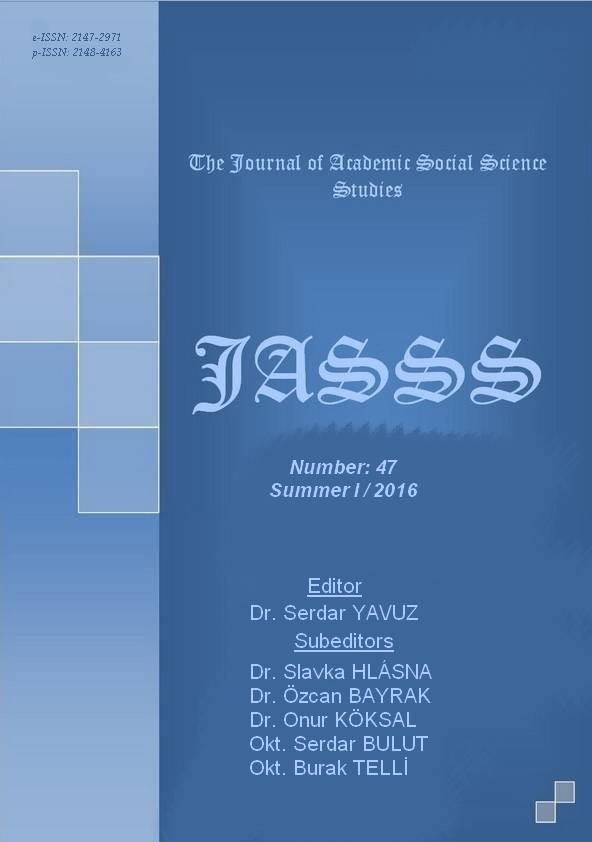Author :
Abstract
Ülkemizde aynı adla 1926 yılı programında ilk defa yer alıp sonraki her öğretim programında kendine önemli bir yer bulan hayat bilgisi dersinin öğretim programı Milli Eğitim Bakanlığı Talim ve Terbiye Kurulu tarafından 2016 yılından geçerli olmak üzere yine değiştirilmektedir. 2005 yılında ülkede köklü bir reform olarak sunulup yapılandırmacı bir anlayışla hazırlanan son hayat bilgisi öğretim programı aradan geçen 11 yıllık süreçte tekrar köklü bir değiştirilme sürecini yaşamaktadır. Aradan geçen bu 90 yıllık süreçte defalarca değişime uğrayan hayat bilgisi dersi öğretim programı ile ilgili şu anda son çalışmalar yapılmaktadır. Kamuoyuyla ve eğitim camiasıyla yeterince paylaşılmayan bu öğretim programının değiştirilme gerekçeleri önemlidir. Bu çalışmada bir devlet üniversitesinin eğitim fakültesinde sınıf öğretmeni olmak üzere yetiştirilen öğretmen adaylarının hayat bilgisi öğretim programının değiştirilmesi ihtiyacı üzerine görüşleri sorgulanmaktadır. Araştırmada 70 öğretmen adayıyla yarı yapılandırılmış görüşme gerçekleştirilmiştir. Nitel bir araştırma olarak düzenlenen çalışmada “Hayat bilgisi öğretim programının değişmesi gerekli midir” sorusuna öğretmen adaylarının yaklaşık %53’ü “hayır”, yaklaşık %47’si de “evet” yanıtı vermiş, “Hayat bilgisi öğretim programının değişmesine etki eden nedenler neler olabilir” sorusuna da 28 farklı nedenden oluşan 350 değişim nedeni yazılmıştır. Öğretmen adaylarının en önemli olarak algıladıkları 5 değişim nedeni “Bilim, teknoloji, ekonomi ve sanayideki değişikliklere uyum sağlamak”, “4+4+4 değişikliklerine uyum sağlamak”, “Yapılandırmacı yaklaşımın tam olarak uygulanamaması”, “2005 programının yetersizlikleri” ve “Siyasi etkiler” olarak ortaya çıkmıştır. “Yeni programda hangi kazanımlara mutlaka yer verilmelidir” sorusuna da 31 farklı kazanımdan oluşan 210 kazanım önerisi yazılmıştır. En çok gerekli görülen kazanımların “Cep telefonu, tablet, bilgisayar gibi teknolojik aletlerin kullanımı (amaç, süre vb.) ile ilgili kazanımlar”, “Vatanın birliği, bütünlüğü ve bölünmezliği ilgili kazanımlar” ve “Atatürk ve cumhuriyetin değerine ilişkin kazanımlar” olduğu ortaya çıkmıştır.
Keywords
Abstract
The curriculum of the life study class, which was included in the 1926 curriculum for the first time (with the same title) and has become an indispensable part of curricula since then, has been modified once more by the Board of Education of the Ministry of National Education, effective as of 2016. The last life study curriculum (of 2005), which was promoted as a radical reform and developed in a constructive manner, is facing another critical modification after 11 years. Currently, the last steps are being taken to alter the life study curriculum, which has undergone several modifications over the past 90 years. The causes of the modifications are noteworthy, about which laypeople and education professionals have not been adequately informed. This study describes and evaluates the views of trainee teachers who are trained in the education faculty of a state university to become primary school teachers concerning the need to alter the curriculum of the life study class. In the present study, a semi-structured interview was used to collect data from 70 trainee teachers. In this qualitative study, 53% and 47% of the participants answered “no” and “yes”, respectively, to the question “Is it necessary to modify the life study curriculum?”. In reply to the question “What are the causes of the modifications in the life study curriculum?”, the participants listed 350 possible causes which can be classified into 28 categories. As far as the participants were concerned, 5 most important causes of the modification were found to be “to keep up with scientific, technological, economic and industrial developments”, “to adapt to the changes caused by the 4+4+4 system”, “the failure to duly implement the constructive approach”, “incompetency of the 2005 curriculum” and “political influences”. The participants listed 210 outcomes in 31 different outcome types in response to the question “What outcomes must surely be included in the new curriculum?”. The study revealed that the most necessary outcomes as stated by the participants were “outcomes related to the use (intended use and duration of use, etc.) of technological devices such as mobile phones, tablets, computers”, “outcomes concerning the unity of and solidarity in the homeland”, and “outcomes related to Atatürk and the values of the republic”.





